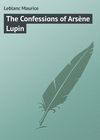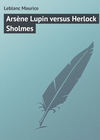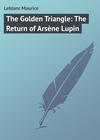Czytaj książkę: «813», strona 14
"It's a sixty," said the German, looking at him uneasily from the corner of his eye.
"Oh, then we're all right!"
They were climbing a little slope. When they reached the top, the count leant out of the window:
"Damn it all!" he swore.
"What's the matter?" asked Lupin.
The count turned to him and, in a threatening voice:
"Take care! If anything happens, it will be so much the worse for you."
"Oho! It seems the other's gaining on us!.. But what are you afraid of, my dear count? It's no doubt a traveller.. perhaps even some one they are sending to help us."
"I don't want any help," growled the German.
He leant out again. The car was only two or three hundred yards behind.
He said to his men, pointing to Lupin.
"Bind him. If he resists.."
He drew his revolver.
"Why should I resist, O gentle Teuton?" chuckled Lupin. And he added, while they were fastening his hands, "It is really curious to see how people take precautions when they need not and don't when they ought to. What the devil do you care about that motor? Accomplices of mine? What an idea!"
Without replying, the German gave orders to the driver:
"To the right!.. Slow down!.. Let them pass… If they slow down also, stop!"
But, to his great surprise, the motor seemed, on the contrary, to increase its speed. It passed in front of the car like a whirlwind, in a cloud of dust. Standing up at the back, leaning over the hood, which was lowered, was a man dressed in black.
He raised his arm.
Two shots rang out.
The count, who was blocking the whole of the left window, fell back into the car.
Before even attending to him, the two men leapt upon Lupin and finished securing him.
"Jackasses! Blockheads!" shouted Lupin, shaking with rage. "Let me go, on the contrary! There now, we're stopping! But go after him, you silly fools, catch him up!.. It's the man in black, I tell you, the murderer!.. Oh, the idiots!."
They gagged him. Then they attended to the count. The wound did not appear to be serious and was soon dressed. But the patient, who was in a very excited state, had an attack of fever and became delirious.
It was eight o'clock in the morning. They were in the open country, far from any village. The men had no information as to the exact object of the journey. Where were they to go? Whom were they to send to?
They drew up the motor beside a wood and waited. The whole day went by in this way. It was evening before a squad of cavalry arrived, dispatched from Treves in search of the motor-car.
Two hours later, Lupin stepped out of the car, and still escorted by his two Germans, by the light of a lantern climbed the steps of a staircase that led to a small room with iron-barred windows.
Here he spent the night.
The next morning, an officer led him, through a courtyard filled with soldiers, to the centre of a long row of buildings that ran round the foot of a mound covered with monumental ruins.
He was shown into a large, hastily-furnished room. His visitor of two days back was sitting at a writing-table, reading newspapers and reports, which he marked with great strokes of red pencil:
"Leave us," he said to the officer.
And, going up to Lupin:
"The papers."
The tone was no longer the same. It was now the harsh and imperious tone of the master who is at home and addressing an inferior.. and such an inferior! A rogue, an adventurer of the worst type, before whom he had been obliged to humiliate himself!
"The papers," he repeated.
Lupin was not put out of countenance. He said, quite calmly:
"They are in Veldenz Castle."
"We are in the out-buildings of the castle. Those are the ruins of Veldenz, over there."
"The papers are in the ruins."
"Let us go to them. Show me the way."
Lupin did not budge.
"Well?"
"Well, Sire, it is not as simple as you think. It takes some time to bring into play the elements which are needed to open that hiding-place."
"How long do you want?"
"Twenty-four hours."
An angry movement, quickly suppressed:
"Oh, there was no question of that between us!"
"Nothing was specified, neither that nor the little trip which Your Imperial Majesty made me take in the charge of half a dozen of your body-guard. I am to hand over the papers, that is all."
"And I am not to give you your liberty until you do hand over those papers."
"It is a question of confidence, Sire. I should have considered myself quite as much bound to produce the papers if I had been free on leaving prison; and Your Imperial Majesty may be sure that I should not have walked off with them. The only difference is that they would now be in your possession. For we have lost a day, Sire. And a day, in this business.. is a day too much… Only, there it is, you should have had confidence."
The Emperor gazed with a certain amazement at that outcast, that vagabond, who seemed vexed that any one should doubt his word.
He did not reply, but rang the bell:
"The officer on duty," he commanded.
Count von Waldemar appeared, looking very white.
"Ah, it's you, Waldemar? So you're all right again?"
"At your service, Sire."
"Take five men with you.. the same men, as you're sure of them. Don't leave this.. gentleman until to-morrow morning." He looked at his watch. "Until to-morrow morning at ten o'clock. No, I will give him till twelve. You will go wherever he thinks fit to go, you will do whatever he tells you to do. In short, you are at his disposal. At twelve o'clock, I will join you. If, at the last stroke of twelve, he has not handed me the bundle of letters, you will put him back in your car and, without losing a second, take him straight to the Santé Prison."
"If he tries to escape.."
"Take your own course."
He went out.
Lupin helped himself to a cigar from the table and threw himself into an easy chair:
"Good! I just love that way of going to work. It is frank and explicit."
The count had brought in his men. He said to Lupin:
"March!"
Lupin lit his cigar and did not move.
"Bind his hands," said the count.
And, when the order was executed, he repeated:
"Now then, march!"
"No."
"What do you mean by no?"
"I'm wondering."
"What about?"
"Where on earth that hiding-place can be!"
The count gave a start and Lupin chuckled:
"For the best part of the story is that I have not the remotest idea where that famous hiding-place is nor how to set about discovering it. What do you say to that, my dear Waldemar, eh? Funny, isn't it?.. Not the very remotest idea!."
CHAPTER XII
THE EMPEROR'S LETTERS
The ruins of Veldenz are well known to all who visit the banks of the Rhine and the Moselle. They comprise the remains of the old feudal castle, built in 1377 by the Archbishop of Fistingen, an enormous dungeon-keep, gutted by Turenne's troops, and the walls, left standing in their entirety, of a large Renascence palace, in which the grand-dukes of Zweibrucken lived for three centuries.
It was this palace that was sacked by Hermann II.'s rebellious subjects. The empty windows display two hundred yawning cavities on the four frontages. All the wainscoting, the hangings and most of the furniture were burnt. You walk on the scorched girders of the floors; and the sky can be seen at intervals through the ruined ceilings.
Lupin, accompanied by his escort, went over the whole building in two hours' time:
"I am very pleased with you, my dear count. I don't think I ever came across a guide so well posted in his subject, nor – which is rare – so silent. And now, if you don't mind, we will go to lunch."
As a matter of fact, Lupin knew no more than at the first moment and his perplexity did nothing but increase. To obtain his release from prison and to strike the imagination of his visitor, he had bluffed, pretending to know everything; and he was still seeking for the best place at which to begin to seek.
"Things look bad," he said to himself, from time to time. "Things are looking about as bad as they can look."
His brain, moreover, was not as clear as usual. He was obsessed by an idea, the idea of "the other one," the murderer, the assassin, whom he knew to be still clinging to his footsteps.
How did that mysterious personality come to be on his tracks? How had he heard of Lupin's leaving prison and of his rush to Luxemburg and Germany? Was it a miraculous intuition? Or was it the outcome of definite information? But, if so, at what price, by means of what promises or threats was he able to obtain it?
All these questions haunted Lupin's mind.
At about four o'clock, however, after a fresh walk through the ruins, in the course of which he had examined the stones, measured the thickness of the walls, investigated the shape and appearance of things, all to no purpose, he asked the count:
"Is there no one left who was in the service of the last grand-duke who lived in the castle?"
"All the servants of that time went different ways. Only one of them continued to live in the district."
"Well?"
"He died two years ago."
"Any children?"
"He had a son, who married and who was dismissed, with his wife, for disgraceful conduct. They left their youngest child behind, a little girl, Isilda."
"Where does she live?"
"She lives here, at the end of these buildings. The old grandfather used to act as a guide to visitors, in the days when the castle was still open to the public. Little Isilda has lived in the ruins ever since. She was allowed to remain out of pity. She is a poor innocent, who is hardly able to talk and does not know what she says."
"Was she always like that?"
"It seems not. Her reason went gradually, when she was about ten years old."
"In consequence of a sorrow, of a fright?"
"No, for no direct cause, I am told. The father was a drunkard and the mother committed suicide in a fit of madness."
Lupin reflected and said:
"I should like to see her."
The count gave a rather curious smile:
"You can see her, by all means."
She happened to be in one of the rooms which had been set apart for her. Lupin was surprised to find an attractive little creature, too thin, too pale, but almost pretty, with her fair hair and her delicate face. Her sea-green eyes had the vague, dreamy look of the eyes of blind people.
He put a few questions to which Isilda gave no answer and others to which she replied with incoherent sentences, as though she understood neither the meaning of the words addressed to her nor those which she herself uttered.
He persisted, taking her very gently by the hand and asking her in an affectionate tone about the time when she still had her reason, about her grandfather, about the memories which might be called up by her life as a child playing freely among the majestic ruins of the castle.
She stood silent, with staring eyes; impassive, any emotion which she might have felt was not enough to rouse her slumbering intelligence.
Lupin asked for a pencil and paper and wrote down the number 813.
The count smiled again.
"Look here, what are you laughing at?" cried Lupin, irritably.
"Nothing.. nothing… I'm very much interested, that's all.."
Isilda looked at the sheet of paper, when he showed it to her, and turned away her head, with a vacant air.
"No bite!" said the count, satirically.
Lupin wrote the letters "APOON."
Isilda paid no more attention than before.
He did not give up the experiment, but kept on writing the same letters, each time watching the girl's face.
She did not stir, but kept her eyes fixed on the paper with an indifference which nothing seemed to disturb. Then, all at once, she seized the pencil, snatched the last sheet out of Lupin's hands and, as though acting under a sudden inspiration, wrote two "L's" in the middle of a space left open by Lupin.
He felt a thrill.
A word had been formed: "APOLLON."
Meanwhile, Isilda clung to both pencil and paper and, with clutching fingers and a strained face, was struggling to make her hand submit to the hesitating orders of her poor little brain.
Lupin waited, feverishly.
She rapidly wrote another word, the word "DIANE."
"Another word!.. Another word!" shouted Lupin.
She twisted her fingers round the pencil, broke the lead, made a big "J" with the stump and, now utterly exhausted, dropped the pencil.
"Another word! I must have another word!" said Lupin, in a tone of command, catching her by the arm.
But he saw by her eyes, which had once more become indifferent, that that fleeting gleam of intelligence could not shine out again.
"Let us go," he said.
He was walking away, when she ran after him and stood in his path. He stopped:
"What is it?"
She held out the palm of her hand.
"What? Money?.. Is she in the habit of begging?" he asked the count.
"No," said Waldemar, "and I can't understand."
Isilda took two gold coins from her pocket and chinked them together, gleefully.
Lupin looked at them. They were French coins, quite new, bearing the date of that year.
"Where did you get these?" asked Lupin, excitedly.
"French money!.. Who gave it you?.. And when?.. Was it to-day? Speak!.. Answer!." He shrugged his shoulders. "Fool that I am! As though she could answer!.. My dear count, would you mind lending me forty marks?.. Thanks.. Here, Isilda, that's for you."
She took the two coins, jingled them with the others in the palm of her hand and then, putting out her arm, pointed to the ruins of the Renascence palace, with a gesture that seemed to call attention more particularly to the left wing and to the top of that wing.
Was it a mechanical movement? Or must it be looked upon as a grateful acknowledgment for the two gold coins?
He glanced at the count. Waldemar was smiling again.
"What makes the brute keep on grinning like that?" said Lupin to himself. "Any one would think that he was having a game with me."
He went to the palace on the off-chance, attended by his escort.
The ground-floor consisted of a number of large reception-rooms, running one into the other and containing the few pieces of furniture that had escaped the fire.
On the first floor, on the north side, was a long gallery, out of which twelve handsome rooms opened all exactly alike.
There was a similar gallery on the second floor, but with twenty-four smaller rooms, also resembling one another. All these apartments were empty, dilapidated, wretched to look at.
Above, there was nothing. The attics had been burnt down.
For an hour, Lupin walked, ran, rushed about indefatigably, with his eyes on the look-out.
When it began to grow dusk, he hurried to one of his twelve rooms on the first floor, as if he were selecting it for special reasons known to himself alone. He was rather surprised to find the Emperor there, smoking and seated in an arm-chair which he had sent for.
Taking no notice of his presence, Lupin began an inspection of the room, according to the methods which he was accustomed to employ in such cases, dividing the room into sections, each of which he examined in turn.
After twenty minutes of this work, he said:
"I must beg you, Sire, to be good enough to move. There is a fireplace here.."
The Emperor tossed his head:
"Is it really necessary for me to move?"
"Yes, Sire, this fireplace."
"The fireplace is just the same as the others and the room is no different from its fellows."
Lupin looked at the Emperor without understanding. The Emperor rose and said, with a laugh:
"I think, M. Lupin, that you have been making just a little fun of me."
"How do you mean, Sire?"
"Oh, it's hardly worth mentioning! You obtained your release on the condition of handing me certain papers in which I am interested and you have not the smallest notion as to where they are. I have been thoroughly – what do you call it, in French? —roulé 'done'!"
"Do you think so, Sire?"
"Why, what a man knows he doesn't have to hunt for! And you have been hunting for ten good hours! Doesn't it strike you as a case for an immediate return to prison?"
Lupin seemed thunderstruck:
"Did not Your Imperial Majesty fix twelve o'clock to-morrow as the last limit?"
"Why wait?"
"Why? Well, to allow me to complete my work!"
"Your work? But it's not even begun, M. Lupin."
"There Your Imperial Majesty is mistaken."
"Prove it.. and I will wait until to-morrow."
Lupin reflected and, speaking in a serious tone:
"Since Your Imperial Majesty requires proofs in order to have confidence in me, I will furnish them. The twelve rooms leading out of this gallery each bear a different name, which is inscribed in French – obviously by a French decorative artist – over the various doors. One of the inscriptions, less damaged by the fire than the others, caught my eye as I was passing along the gallery. I examined the other doors: all of them bore hardly legible traces of names caned over the pediments. Thus I found a 'D' and an 'E' the first and last letters of 'Diane.' I found an 'A' and 'LON' which pointed to 'Apollon.' These are the French equivalents of Diana and Apollo, both of them mythological deities. The other inscriptions presented similar characteristics. I discovered traces of such names as Jupiter, Venus, Mercury, Saturn and so on. This part of the problem was solved: each of the twelve rooms bears the name of an Olympian god or goddess; and the letters APOON, completed by Isilda, point to the Apollo Room or Salle d'Apollon. So it is here, in the room in which we now are, that the letters are hidden. A few minutes, perhaps, will suffice in which to discover them."
"A few minutes or a few years.. or even longer!" said the Emperor, laughing.
He seemed greatly amused; and the count also displayed a coarse merriment.
Lupin asked:
"Would Your Imperial Majesty be good enough to explain?"
"M. Lupin, the exciting investigation which you have conducted to-day and of which you are telling us the brilliant results has already been made by me.. yes, a fortnight ago, in the company of your friend Holmlock Shears. Together we questioned little Isilda; together, we employed the same method in dealing with her that you did; and together we observed the names in the gallery and got as far as this room, the Apollo Room."
Lupin turned livid. He spluttered:
"Oh, did Shears get.. as far as.. this?"
"Yes, after four days' searching. True, it did not help us, for we found nothing. All the same, I know that the letters are not here."
Trembling with rage, wounded in his innermost pride, Lupin fired up under the gibe, as though he had been lashed with a whip. He had never felt humiliated to such a degree as this. In this fury, he could have strangled the fat Waldemar, whose laughter incensed him. Containing himself with an effort, he said:
"It took Shears four days, Sire, and me only four hours. And I should have required even less, if I had not been thwarted in my search."
"And by whom, bless my soul? By my faithful count? I hope he did not dare.. !"
"No, Sire, but by the most terrible and powerful of my enemies, by that infernal being who killed his own accomplice Altenheim."
"Is he here? Do you think so?" exclaimed the Emperor, with an agitation which showed that he was familiar with every detail of the dramatic story.
"He is wherever I am. He threatens me with his constant hatred. It was he who guessed that I was M. Lenormand, the chief of the detective-service; it was he who had me put in prison; it was he, again, who pursued me, on the day when I came out. Yesterday, aiming at me in the motor, he wounded Count von Waldemar."
"But how do you know, how can you be sure that he is at Veldenz?"
"Isilda has received two gold coins, two French coins!"
"And what is he here for? With what object?"
"I don't know, Sire, but he is the very spirit of evil. Your Imperial Majesty must be on your guard: he is capable of anything and everything."
"It is impossible! I have two hundred men in the ruins. He cannot have entered. He would have been seen."
"Some one has seen him, beyond a doubt."
"Who?"
"Isilda."
"Let her be questioned! Waldemar, take your prisoner to where the girl is."
Lupin showed his bound hands:
"It will be a tough battle. Can I fight like this?"
The Emperor said to the count:
"Unfasten him… And keep me informed."
In this way, by a sudden effort, bringing the hateful vision of the murder into the discussion, boldly, without evidence, Arsène Lupin gained time and resumed the direction of the search:
"Sixteen hours still," he said to himself, "it's more than I want."
He reached the premises occupied by Isilda, at the end of the old out-buildings. These buildings served as barracks for the two hundred soldiers guarding the ruins; and the whole of this, the left wing, was reserved for the officers.
Isilda was not there. The count sent two of his men to look for her. They came back. No one had seen the girl.
Nevertheless, she could not have left the precincts of the ruins. As for the Renascence palace, it was, so to speak, invested by one-half of the troops; and no one was able to obtain admittance.
At last, the wife of a subaltern who lived in the next house declared that she had been sitting at her window all day and that the girl had not been out.
"If she hadn't gone out," said Waldemar, "she would be here now: and she is not here."
Lupin observed:
"Is there a floor above?"
"Yes, but from this room to the upper floor there is no staircase."
"Yes, there is."
He pointed to a little door opening on a dark recess. In the shadow, he saw the first treads of a staircase as steep as a ladder.
"Please, my dear count," he said to Waldemar, who wanted to go up, "let me have the honor."
"Why?"
"There's danger."
He ran up and at once sprang into a low and narrow loft. A cry escaped him:
"Oh!"
"What is it?" asked the count, emerging in his turn.
"Here.. on the floor… Isilda.."
He knelt down beside the girl, but, at the first glance, saw that she was simply stunned and that she bore no trace of a wound, except a few scratches on the wrists and hands. A handkerchief was stuffed into her mouth by way of a gag.
"That's it," he said. "The murderer was here with her. When we came, he struck her a blow with his fist and gagged her so that we should not hear her moans."
"But how did he get away?"
"Through here.. look.. there is a passage connecting all the attics on the first floor."
"And from there?"
"From there, he went down the stairs of one of the other dwellings."
"But he would have been seen!"
"Pooh, who knows? The creature's invisible. Never mind! Send your men to look. Tell them to search all the attics and all the ground-floor lodgings."
He hesitated. Should he also go in pursuit of the murderer?
But a sound brought him back to the girl's side. She had got up from the floor and a dozen pieces of gold money had dropped from her hands. He examined them. They were all French.
"Ah," he said, "I was right! Only, why so much gold? In reward for what?"
Suddenly, he caught sight of a book on the floor and stooped to pick it up. But the girl darted forward with a quicker movement, seized the book and pressed it to her bosom with a fierce energy, as though prepared to defend it against any attempt to take hold of it.
"That's it," he said. "The money was offered her for the book, but she refused to part with it. Hence the scratches on the hands. The interesting thing would be to know why the murderer wished to possess the book. Was he able to look through it first?"
He said to Waldemar:
"My dear count, please give the order."
Waldemar made a sign to his men. Three of them threw themselves on the girl and, after a hard tussle, in which the poor thing stamped, writhed and screamed with rage, they took the volume from her.
"Gently, child," said Lupin, "be calm… It's all in a good cause… Keep an eye on her, will you? Meanwhile, I will have a look at the object in dispute."
It was an odd volume of Montesquieu's Voyage au temple de Guide, in a binding at least a century old. But Lupin had hardly opened it before he exclaimed:
"I say, I say, this is queer! There is a sheet of parchment stuck on each right hand page; and those sheets are covered with a very close, small handwriting."
He read, at the beginning:
"Diary of the Chevalier Gilles de Malrêche, French servant to His Royal Highness the Prince of Zweibruckenveldenz, begun in the Year of Our Lord 1794."
"What! Does it say that?" asked the count.
"What surprises you?"
"Isilda's grandfather, the old man who died two years ago, was called Malreich, which is the German form of the same name."
"Capital! Isilda's grandfather must have been the son or the grandson of the French servant who wrote his diary in an odd volume of Montesquieu's works. And that is how the diary came into Isilda's hands."
He turned the pages at random:
"15 September, 1796. His Royal Highness went hunting.
"20 September, 1796. His Royal Highness went out riding. He was mounted on Cupidon."
"By Jove!" muttered Lupin. "So far, it's not very exciting."
He turned over a number of pages and read:
"12 March, 1803. I have remitted ten crowns to Hermann. He is giving music-lessons in London."
Lupin gave a laugh:
"Oho! Hermann is dethroned and our respect comes down with a rush!"
"Yes," observed Waldemar, "the reigning grand-duke was driven from his dominions by the French troops."
Lupin continued:
"1809. Tuesday. Napoleon slept at Veldenz last night. I made His Majesty's bed and this morning I emptied his slops."
"Oh, did Napoleon stop at Veldenz?"
"Yes, yes, on his way back to the army, at the time of the Austrian campaign, which ended with the battle of Wagram. It was an honor of which the grand-duchal family were very proud afterwards."
Lupin went on reading:
"28 October, 1814. His Royal Highness returned to his dominions.
"29 October, 1814. I accompanied His Royal Highness to the hiding-place last night and was happy to be able to show him that no one had guessed its existence. For that matter, who would have suspected that a hiding-place could be contrived in."
Lupin stopped, with a shout. Isilda had suddenly escaped from the men guarding her, made a grab at him and taken to flight, carrying the book with her.
"Oh, the little mischief! Quick, you!.. Go round by the stairs below. I'll run after her by the passage."
But she had slammed the door behind her and bolted it. He had to go down and run along the buildings with the others, looking for a staircase which would take them to the first floor.
The fourth house was the only one open. He went upstairs. But the passage was empty and he had to knock at doors, force locks and make his way into unoccupied rooms, while Waldemar, showing as much ardor in the pursuit as himself, pricked the curtains and hangings with the point of his sword.
A voice called out from the ground-floor, towards the right wing. They rushed in that direction. It was one of the officers' wives, who beckoned to them at the end of a passage and told them that the girl must be in her lodging.
"How do you know?" asked Lupin.
"I wanted to go to my room. The door was shut and I could not get in."
Lupin tried and found the door locked:
"The window!" he cried. "There must be a window!"
He went outside, took the count's sword and smashed the panes. Then, helped up by two men, he hung on to the wall, passed his arm through the broken glass, turned the latch and stumbled into the room.
He saw Isilda huddled before the fireplace, almost in the midst of the flames:
"The little beast!" he said. "She has thrown it into the fire!"
He pushed her back savagely, tried to take the book and burnt his hands in the attempt. Then, with the tongs, he pulled it out of the grate and threw the table cloth over it to stifle the blaze.
But it was too late. The pages of the old manuscript, all burnt up, were falling into ashes.
Lupin gazed at her in silence. The count said:
"One would think that she knew what she was doing."
"No, she does not know. Only, her grandfather must have entrusted her with that book as a sort of treasure, a treasure which no one was ever to set eyes on, and, with her stupid instinct, she preferred to throw it into the fire rather than part with it."
"Well then.."
"Well then what?"
"You won't find the hiding-place."
"Aha, my dear count, so you did, for a moment, look upon my success as possible? And Lupin does not strike you as quite a charlatan? Make your mind easy, Waldemar: Lupin has more than one string to his bow. I shall succeed."
"Before twelve o'clock to-morrow?"
"Before twelve o'clock to-night. But, for the moment, I am starving with hunger. And, if your kindness would go so far.."
He was taken to the sergeants' mess and a substantial meal prepared for him, while the count went to make his report to the Emperor.
Twenty minutes later, Waldemar returned and they sat down and dined together, opposite each other, silent and pensive.
"Waldemar, a good cigar would be a treat… I thank you… Ah, this one crackles as a self-respecting Havana should!"
He lit his cigar and, after a minute or two:
"You can smoke, count; I don't mind in the least; in fact, I rather like it."
An hour passed. Waldemar dozed and, from time to time, swallowed a glass of brandy to wake himself up.
Soldiers passed in and out, waiting on them.
"Coffee," asked Lupin.
They brought him some coffee.
"What bad stuff!" he grumbled. "If that's what Cæsar drinks!.. Give me another cup all the same, Waldemar. We may have a long night before us. Oh, what vile coffee!"
He lit a second cigar and did not say another word. Ten minutes passed. He continued not to move or speak.
Suddenly, Waldemar sprang to his feet and said to Lupin, angrily:
"Hi! Stand up, there!"
Lupin was whistling a tune at the moment. He kept on whistling, peacefully.
"Stand up, I say!"
Lupin turned round. His Imperial Majesty had just entered. Lupin rose from his chair.
"How far are we?" asked the Emperor.
"I think, Sire, that I shall be able to satisfy Your Imperial Majesty soon."
"What? Do you know."
"The hiding-place? Very nearly, Sire… A few details still escape me.. but everything will be cleared up, once we are on the spot: I have no doubt of it."
"Are we to stay here?"
"No, Sire, I will beg you to go with me to the Renascence palace. But we have plenty of time; and, if Your Imperial Majesty will permit me, I should like first to think over two or three points."
Without waiting for the reply, he sat down, to Waldemar's great indignation.



















